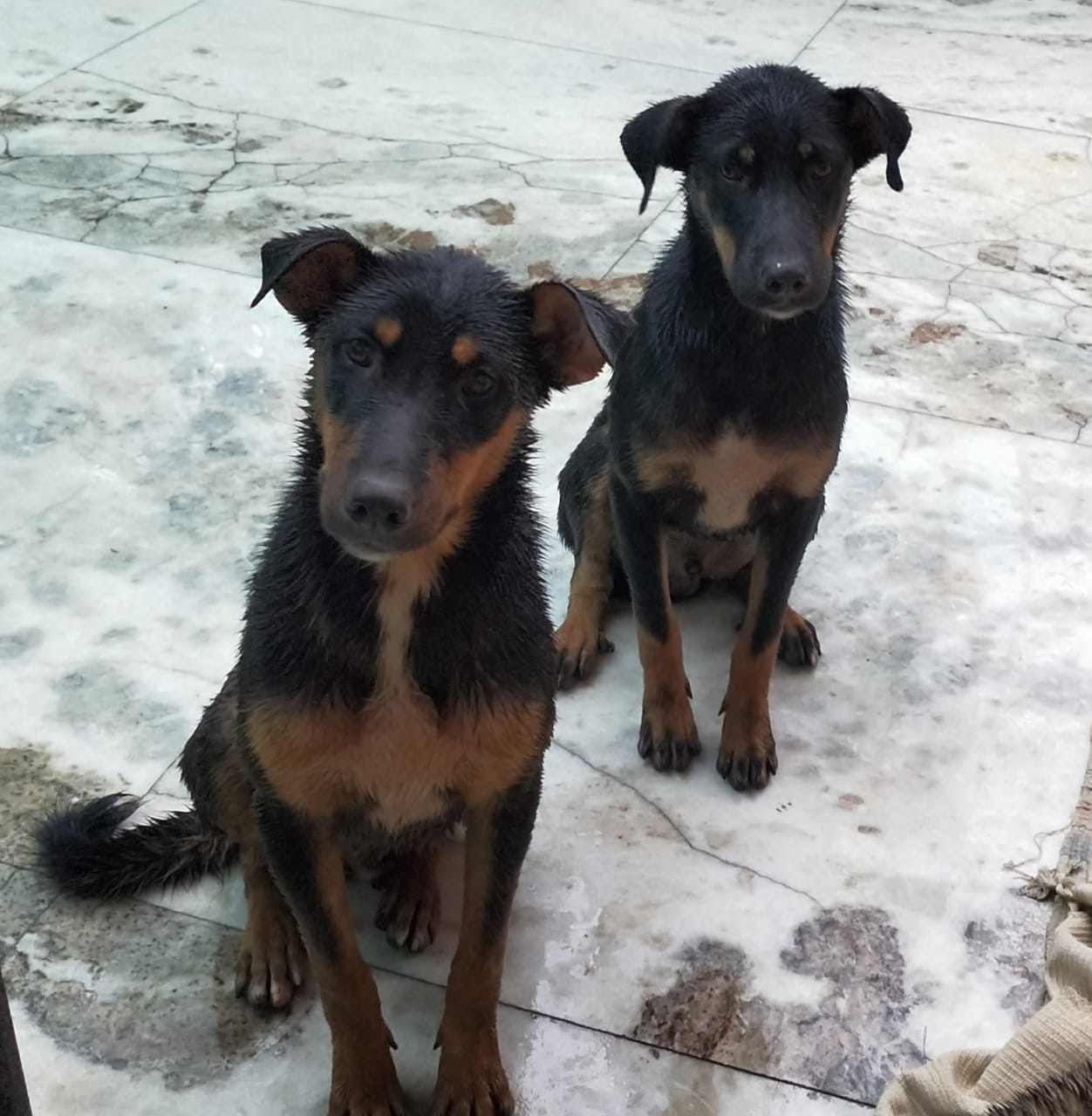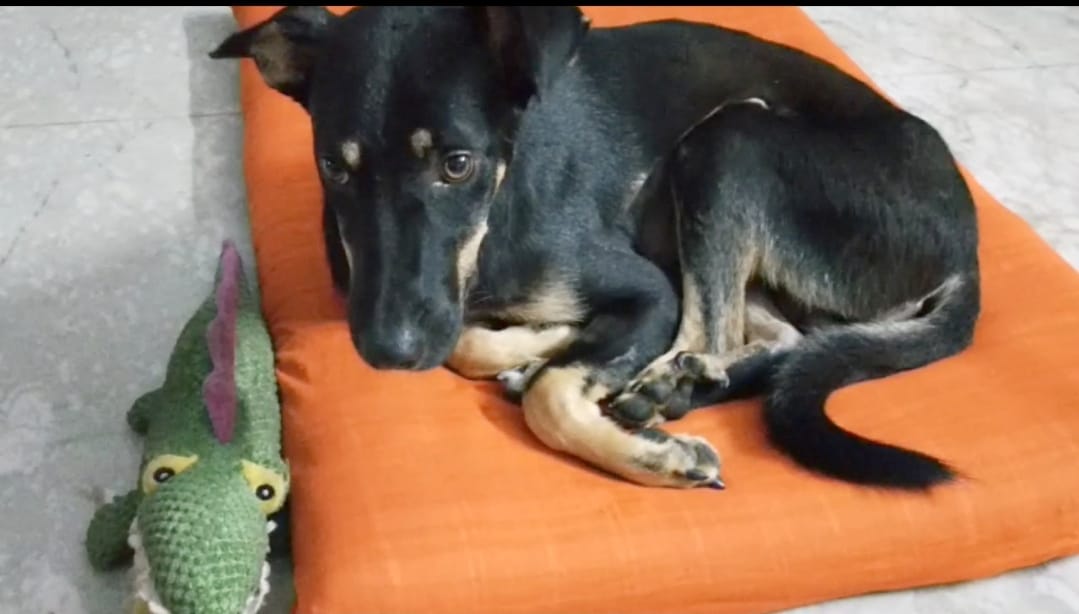While traumatic diaphragmatic hernia (TDH) is common among street dogs, it is still a challenge to treat. The treatment is challenging because of the lack of timely diagnosis and the surgery for TDH can become complicated.
Rarely veterinary clinics have the medical infra to complete the surgery safely and successfully. Gulab was one of the very few lucky pups to have caring humans who brought him to the right veterinary clinic and surgeons at the right time.
How It All Began: Gulab’s Journey
Swati and Pratibha have been taking care of the local streeties for quite a while. Whenever they would reach the feeding point during the evenings, their flock would surround them and shower them with woofs and boops.
Once in a while, dogs from the nearby communities would join them for the occasional meal as well.
That’s how Gulab’s mom and sister came to them more than 1 year ago. Both the dogs were happy to be a part of their new family in the new locality.
In Sept 2022, four precious puppies were born. However, soon there were torrential rains and the mother was helpless as she ran about with her lactating pups.
A kind-hearted woman opened her doors for the dog and her four pups and one of the cuties got adopted almost immediately.
The Real Predicament Begins
Once the rains and waterlogging was over, mommy dog was back on the streets with her 3 pups. That was when canine parvovirus struck. Swati and Pratibha along with other locals ensured that all 3 pups received proper treatment. Sadly, the youngest sister succumbed to parvo leaving her two brothers – Gulab and Jamun.

Believing that the worst was behind them, Swati and Pratibha went out on the evening of 29 May just like every other evening to feel the dogs. That’s when they noticed that Gulab had been in an accident.
Gulab was unable to move, he had difficulty breathing and he refused food. Gauging the urgency of the situation correctly, Swati and Pratibha rushed Gulab to a local veterinary clinic.
The doctor confirmed that he had an injury in his hind leg and recommended an X-ray, which was completed at 10 pm.
Even with treatment, Gulab, the 9-month old indie puppy, continued showing signs of distress. After searching on Google, Swati and Pratibha found out about Vetic, where everything between emergency veterinary consultation and state-of-the-art in-house diagnostics are available.
Pratibha and Swati brought Gulab in for an emergency consultation with Dr. Vaibhav Bishnoi on the afternoon of 30 May. Dr. Bishnoi noticed his breathing difficulties along with a severe pain response. Physical examination revealed unclear heart and lung sounds. He referred Gulab for a chest X-ray immediately.
It took roughly 10-minutes in all to make the correct diagnosis – traumatic diaphragmatic hernia (TDH).
Why Is Traumatic Diaphragmatic Hernia Still A Predicament?
TDH is very common, especially among stray dogs and cats. Traumatic Diaphragmatic Hernia in dogs may happen after direct blunt force trauma to the abdomen such as being hit by a moving vehicle, blow to the abdomen or falling from a great height. Just like dogs, cats may also acquire TDH for similar reasons.
The common signs include shallow breathing, irregular heart beats, and symptoms of shock.
Sadly, in many cities and states, TDH is a death sentence. Although it is easy to diagnose, the corrective surgery necessary is not easy. Apart from experience and carefully honed surgical skills, the veterinary surgeon operating on a diaphragmatic hernia will require a ventilator that can keep the animal stable while the surgery is on.
A ventilator makes surgeries of TDH and lung lobectomy possible at Vetic. At the same time, the emergency and critical care doctors can use a ventilator to stabilise a dog who has suffered a severe shock and stopped breathing.
What Makes Gulab’s Case Different from the Others?
Gulab was one of the few lucky streetie babies to have such caring humans. Had he not been rushed to the Vetic emergency care that day, it could have been too late to correct the internal injuries.
However, we have to give Gulab considerable credit for being such a brave little boy.
The team of senior veterinary surgeons including Dr. Vaibhav Bishnoi, Dr. Manish Soni, Dr. Vikas Sharma and Dr. Dheeraj had to operate on him under general (gas) anaesthesia. A considerably large incision had to be made since a large part of his stomach, spleen, liver and intestines had perforated the separating membrane (diaphragm) between the abdominal cavity and the thorax (chest).
These organs were creating a huge pressure on the lungs and making it difficult for Gulab to breathe. So, apart from retracting the organs back into the right place, the veterinarians also had to stabilise the pressure inside the thoracic cavity so Gulab’s lungs could expand naturally.
And that was probably the most challenging part. Throughout the time, Gulab was maintained on the ventilator and his vitals monitored closely by Dr. Bishnoi’s team.
Then, they performed a magic trick known as transdiaphragmatic thoracocentesis in fancy terms, which means using a plastic catheter to remove the excess air and re-introduce negative pressure within the chest cavity.

Now, It’s Time for Gulab’s Recovery From Traumatic Diaphragmatic Hernia!
After the procedure, Gulab regained consciousness quite fast. However, he wasn’t out of the risk zone just yet. 10 to 20% of the patients who go through corrective surgeries for TDH do not make it in the end. But Gulab was determined to pull through.
He was maintained on a 5 day course of antibiotics, painkillers and anti-inflammatory medicines.
“Gulab is a fighter, He has taught us hope, power in prayers and how you fight hard for the people you love” says Swati who has opened her heart and home for Gulab during his recovery.
Dr. Vaibhav did manage to operate on the TDH successfully, but he couldn’t cut away the dramatics from Gulab’s personality. There was no way Swati or Pratibha could manage to convince Gulab to take his daily meds.
When pleading, begging, bribing – everything failed Gulab was brought back to Vetic for the final round of meds. Rumours have it that Vetic has offered an Honorary Diploma to Gulab for acing in drama and acting.
After a brief stay at Vetic and the completion of the prescribed dose of medicines, Gulab is now back to his territory, where he is now living a lavish life, being pampered by Swati and Pratibha.

